|
|
|
Sort Order |
|
|
|
Items / Page
|
|
|
|
|
|
|
| Srl | Item |
| 1 |
ID:
053730
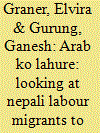

|
|
|
| 2 |
ID:
033206
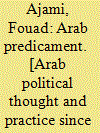

|
|
|
|
|
| Publication |
Cambridge, Cambridge University Press, 1981.
|
| Description |
xvi, 220p.
|
| Standard Number |
0521239141
|
|
|
|
|
|
|
|
|
|
|
|
Copies: C:1/I:0,R:0,Q:0
Circulation
| Accession# | Call# | Current Location | Status | Policy | Location |
| 019884 | 320.9174927/AJA 019884 | Main | On Shelf | General | |
|
|
|
|
| 3 |
ID:
117620


|
|
|
|
|
| Publication |
2012.
|
| Summary/Abstract |
Since late 2010, an unprecedented wave of protests demanding greater political freedoms, and in several countries even regime change, has swept across much of the Arab world. In Tunisia, Egypt, and Libya, long-standing autocrats have been toppled, and in other countries of the region seemingly well-established authoritarian regimes also appeared increasingly shaky in the face of growing opposition movements. The aim of this article is to examine the role of the armed forces in these popular uprisings. While military forces have been key actors in these Arab uprisings, they have responded quite differently across the region to prodemocracy movements, ranging from openness to protest movements, to internal fracturing, to firm support for the regime in power. This article argues that these differences can be explained with reference to different forms of civil-military relations and different characteristics of the military apparatus. It claims in particular that the degree of institutionalization of the armed forces and their relationship to society at large can account for the divergent responses to pro-reform movements.
|
|
|
|
|
|
|
|
|
|
|
|
|
|
|
|
| 4 |
ID:
074756
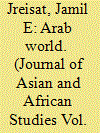

|
|
|
|
|
| Publication |
2006.
|
| Summary/Abstract |
The Arab world is a region of considerable importance for world peace and the global economy. This region, however, is enduring slow development, political instability, extremism, and many ominous prospects of constant conflicts and turmoil. Pressures are mounting from within and from without for change and reform. This article reviews some of the most salient issues facing the region today and examines the opportunities for reform. Particular emphasis is on national development, governance, succession of authority, and Arab-American relations.
|
|
|
|
|
|
|
|
|
|
|
|
|
|
|
|
| 5 |
ID:
176274
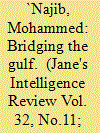

|
|
|
| 6 |
ID:
140487
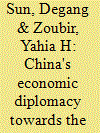

|
|
|
|
|
| Summary/Abstract |
Since the outbreak of the Arab revolts in late 2010, China has adhered to its ‘business-first’ economic diplomacy towards the Arab countries, a policy driven by China's ongoing geoeconomic interests. The ten-year-old China–Arab States Cooperation Forum serves as the nucleus for China's economic diplomacy in the region. The Chinese authorities have also initiated interagency coordination and central–local governments' power sharing in order to pursue this diplomacy successfully. However, while its economic diplomacy may be evolving, China, unlike what it has achieved in Black Africa, seems to have failed to develop strategic, political and cultural exchanges with its Arab counterparts. The intertwined geopolitical and geoeconomic factors that have emerged since the Arab revolts might make it harder for China to reap economic benefits while shelving political entanglement to sustain this economic diplomacy in the longer run.
|
|
|
|
|
|
|
|
|
|
|
|
|
|
|
|
| 7 |
ID:
171442
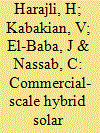

|
|
|
|
|
| Summary/Abstract |
Solar photovoltaic (PV) diesel hybrid systems are effective solutions for sustainable energy transition in countries where utility grids are intermittent. An ‘integrated appraisal’ of 'hybrid solar (PV) - diesel' systems are carried out to assess their overall energetic, environmental, financial and economic performances. The study carries out the analysis of hybridized solar photovoltaic energy using first-hand data and information collected from the Palestinian, Lebanese and Iraqi commercial and/or industrial sectors, adopting several scenarios of tariff and diesel fuel prices, capital costs assumptions, solar PV curtailment, and values for environmental damage adopted from life-cycle impact assessment methods that allow for monetization and are globally valid. Results show that hybrid PV-diesel systems have largely beneficial energy, environmental and economic performances in all three countries, whereas their financial performance are also positive for Palestine and Lebanon, however less promising in Iraq, mainly due Iraq's heavily subsidized electricity tariff. The study concludes with policy recommendations focused on promoting solar PV in the commercial and/or industrial sectors, namely: the gradual phasing-out of fossil fuel subsidies, the effective execution of net-metering, the provision of subsidized sustainable energy loans, and carefully designed energy management systems.
|
|
|
|
|
|
|
|
|
|
|
|
|
|
|
|
| 8 |
ID:
127719
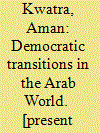

|
|
|
|
|
| Publication |
New Delhi, Delhi Policy Group Publication, 2013.
|
| Description |
ix, 45p.Pbk
|
| Contents |
Conference Report
|
| Standard Number |
9788187206330
|
|
|
|
|
|
|
|
|
|
|
|
Copies: C:2/I:0,R:0,Q:0
Circulation
| Accession# | Call# | Current Location | Status | Policy | Location |
| 057599 | 321.809174927/KWA 057599 | Main | On Shelf | General | |
| 057891 | 321.809174927/KWA 057891 | Main | On Shelf | General | |
|
|
|
|
| 9 |
ID:
073549
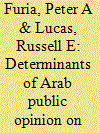

|
|
|
|
|
| Publication |
2006.
|
| Summary/Abstract |
Using Zogby International polling data from seven different Arab nations (Egypt, Jordan, Kuwait, Lebanon, Morocco, Saudi Arabia, and the United Arab Emirates) this paper offers a societal-level quantitative analysis (N=91 dyads) of the determinants of Arab public opinion toward 13 different non-Arab countries (Canada, China, France, Germany, India, Iran, Israel, Japan, Pakistan, Russia, Turkey, the United Kingdom, and the United States). We first explore whether Arab public opinion toward these countries is predicted by general "realist," "liberal," "Marxist," and/or "cultural" hypotheses suggested in the IR/foreign policy literature. After finding few statistically significant relationships among these variables, we present evidence that Arab publics evaluate non-Arab countries on the basis of those countries' specific foreign policy behaviors throughout the wider Middle East (e.g., especially those behaviors affecting Palestine and Iraq). Noting that these evaluations occur in the context of competing identity frames, we provisionally link Arab publics' concerns with "regional" matters to the high salience of "Arabist" identity among respondents to the Zogby survey.
|
|
|
|
|
|
|
|
|
|
|
|
|
|
|
|
| 10 |
ID:
102017
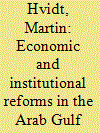

|
|
|
|
|
| Publication |
2011.
|
| Summary/Abstract |
Over the last decades, Dubai has applied an economic developmental model which is strongly pro-business, emphasizes market liberalism and economic openness, and embraces globalization, while at the same time refraining from challenging the traditional neo-patrimonial leadership structure in the country. As such, the "Dubai model" has so far been distinctly different from economic models applied in the other GCC countries. However, judging from official statements, development projects under implementation, and the effort currently expended in creating economic assets in the other GCC states, these states seem to be embracing the "Dubai model" of development. This article will analyze the claim that the "Dubai model" is displacing the rentier state model as the general developmental model among the Gulf countries.
|
|
|
|
|
|
|
|
|
|
|
|
|
|
|
|
| 11 |
ID:
065011
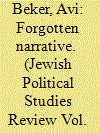

|
|
|
| 12 |
ID:
124368
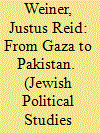

|
|
|
|
|
| Publication |
2011.
|
| Summary/Abstract |
On the one hand, there is Israel's targeted killing (TK) policy which has been conducted in almost full compliance with Human Rights Watch's stated test, executed with remarkable transparency, and has achieved unprecedented levels of intelligence accuracy, with less than one civilian fatality average per TK. In over 95 percent of Israeli TKs neither the identity of the targeted militant nor his involvement in hostilities was subject to dispute. On the other hand, there is a Western TK policy which in many cases did not comply with HRW's stated test and is conducted behind a cloak of systemic and deliberate opacity, with virtually no public scrutiny. Due to faulty or compromised intelligence, this policy resulted in a large number of TKs where the target was not in fact at the targeted location, and with a ratio of more than ten civilian fatalities per TK.
|
|
|
|
|
|
|
|
|
|
|
|
|
|
|
|
| 13 |
ID:
073387
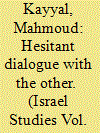

|
|
|
|
|
| Publication |
2006.
|
| Summary/Abstract |
The Arab-Israeli conflict has provided fertile ground for stereotypes, prejudices, and antagonistic dialogue between the two sides. This hostile atmosphere led to a lack of public and academic interest in Israeli culture on the part of Arab intellectuals until the late 1960s. The military defeat in the 1967 war persuaded various elements in the Arab world, particularly Egyptian and Palestinian, to invest a good deal of effort into gaining knowledge of the Israeli 'Other'. Research and translation activity on the subject of Israeli culture has broadened and improved over the years, but it is trapped between two conflicting attitudes to this culture. Scholars and translators close to nationalistic, leftist, and fundamentalist circles adopted an extreme antagonistic attitude, which emphasized the view of 'the Other' as alien and threatening; this standpoint encouraged tendentious methods of research and translation which supported and strengthened it. As against this, other scholars and translators adopted a liberal and pragmatic attitude, which did not negate fruitful dialogue with 'the Other'. This attitude encouraged more objective research and translation, which placed emphasis on the aesthetic and literary value of the translated texts.
|
|
|
|
|
|
|
|
|
|
|
|
|
|
|
|
| 14 |
ID:
044828
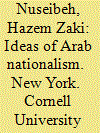

|
|
|
|
|
| Publication |
New York, Cornell University Press, 1956.
|
| Description |
xiii, 227p.
|
|
|
|
|
|
|
|
|
|
|
|
Copies: C:1/I:0,R:0,Q:0
Circulation
| Accession# | Call# | Current Location | Status | Policy | Location |
| 000583 | 320.5409174927/NUS 000583 | Main | On Shelf | General | |
|
|
|
|
| 15 |
ID:
181114
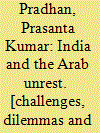

|
|
|
|
|
| Publication |
Oxon, Routledge, 2022.
|
| Description |
xix, 179p.hbk
|
| Series |
Routledge Studies on Think Asia
|
| Standard Number |
9780367618506
|
|
|
|
|
|
|
|
|
|
|
|
Copies: C:1/I:0,R:0,Q:0
Circulation
| Accession# | Call# | Current Location | Status | Policy | Location |
| 060068 | 327.54017/PRA 060068 | Main | On Shelf | General | |
|
|
|
|
| 16 |
ID:
026853
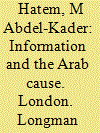

|
|
|
|
|
| Publication |
London, Longman Group Ltd., 1974.
|
| Description |
xiv, 320p.hbk
|
| Standard Number |
0582780403
|
|
|
|
|
|
|
|
|
|
|
|
Copies: C:1/I:0,R:0,Q:0
Circulation
| Accession# | Call# | Current Location | Status | Policy | Location |
| 013534 | 956/HAT 013534 | Main | On Shelf | General | |
|
|
|
|
| 17 |
ID:
099023
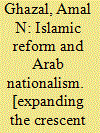

|
|
|
|
|
| Publication |
London, Routledge, 2010.
|
| Description |
xiv, 171p.
|
| Series |
Culture and civilization in the Middle East
|
| Standard Number |
9780415779807, hbk
|
|
|
|
|
|
|
|
|
|
|
|
Copies: C:1/I:0,R:0,Q:0
Circulation
| Accession# | Call# | Current Location | Status | Policy | Location |
| 055272 | 320.5409174927/GHA 055272 | Main | On Shelf | General | |
|
|
|
|
| 18 |
ID:
118315
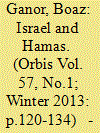

|
|
|
|
|
| Publication |
2013.
|
| Summary/Abstract |
Inarguably, the Islamist revolutions in the Arab countries' neighboring Israel, and the Muslim Brotherhood's rise to power in these countries, presents Israel with many, perhaps unprecedented, political and security challenges. However, in assessing the threat to its southern border, Israel must analyze in depth the intra- and extra-organizational influences on Hamas's motivation to attack, and formulate a responsible policy to ensure the safety of its citizens. Israel must use every means at its disposal to influence and pressure Hamas's leadership to choose responsibly, and avoid dangerous military "adventures."
|
|
|
|
|
|
|
|
|
|
|
|
|
|
|
|
| 19 |
ID:
140590
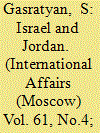

|
|
|
|
|
| Summary/Abstract |
THEIR RELATIONSHIPS have been and remain very special. Jordan has never left its anti-Zionist course but was invariably guided by practical considerations: Israel's geographic proximity, the pro-Western orientation of King Hussein and very modest territorial aspirations. The state of war between them which had begun in 1948 ended much later with a peace treaty of July 25, 1994.
|
|
|
|
|
|
|
|
|
|
|
|
|
|
|
|
| 20 |
ID:
146979
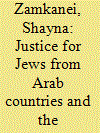

|
|
|
|
|
| Summary/Abstract |
Since its founding in 2002, the group Justice for Jews from Arab Countries (JJAC) has appealed to governments, international organizations, and Jewish communities worldwide to recognize post-1948 Jewish emigrants from Arab countries as refugees. Yet prominent scholars, Israeli government officials, and Jewish political activists in Israel and the United States have traditionally opposed this designation. Why, then, have JJAC's efforts met with success? This article draws on the experiences of JJAC and its predecessor, the World Organization of Jews from Arab Countries, as well as the claims of their critics, to argue that JJAC's accomplishments are due to the organization's ability to extricate the term “refugee” from a Zionist discursive context and to apply it within the framework of international law and human rights.
|
|
|
|
|
|
|
|
|
|
|
|
|
|
|
|
|
|
|
|
|